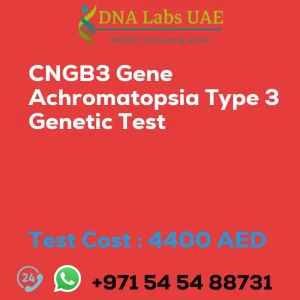GJA8 Gene Cataract-microcornea Syndrome Genetic Test
Test Name: GJA8 Gene Cataract-microcornea Syndrome Genetic Test
Components: GJA8 gene sequencing
Price: 4400.0 AED
Sample Condition: Blood or Extracted DNA or One drop Blood on FTA Card
Report Delivery: 3 to 4 Weeks
Method: NGS Technology
Test Type: Ophthalmology Disorders
Doctor: Ophthalmologist
Test Department: Genetics
Pre Test Information: Clinical History of Patient who is going for GJA8 Gene Cataract-microcornea Syndrome NGS Genetic DNA Test. A Genetic Counselling session to draw a pedigree chart of family members affected with GJA8 Gene Cataract-microcornea Syndrome NGS Genetic DNA Test gene GJA8.
Test Details: The GJA8 gene is associated with cataract-microcornea syndrome, a rare genetic disorder characterized by the presence of cataracts and abnormally small corneas. NGS genetic testing can be used to identify mutations in the GJA8 gene that are responsible for this condition. This type of testing involves sequencing the entire gene to identify any changes in the DNA sequence that may be causing the disorder. The results of the test can help to confirm a diagnosis of cataract-microcornea syndrome and provide information about the inheritance pattern of the condition. This information can be used to help affected individuals and their families understand the risks of passing the disorder on to future generations and to make informed decisions about family planning and medical management.
| Test Name | GJA8 Gene Cataract-microcornea syndrome Genetic Test |
|---|---|
| Components | |
| Price | 4400.0 AED |
| Sample Condition | Blood or Extracted DNA or One drop Blood on FTA Card |
| Report Delivery | 3 to 4 Weeks |
| Method | NGS Technology |
| Test type | Ophthalmology Disorders |
| Doctor | Ophthalmologist |
| Test Department: | Genetics |
| Pre Test Information | Clinical History of Patient who is going for GJA8 Gene Cataract-microcornea syndrome NGS Genetic DNA Test. A Genetic Counselling session to draw a pedigree chart of family members affected with GJA8 Gene Cataract-microcornea syndrome NGS Genetic DNA Test gene GJA8 |
| Test Details |
The GJA8 gene is associated with cataract-microcornea syndrome, a rare genetic disorder characterized by the presence of cataracts and abnormally small corneas. NGS genetic testing can be used to identify mutations in the GJA8 gene that are responsible for this condition. This type of testing involves sequencing the entire gene to identify any changes in the DNA sequence that may be causing the disorder. The results of the test can help to confirm a diagnosis of cataract-microcornea syndrome and provide information about the inheritance pattern of the condition. This information can be used to help affected individuals and their families understand the risks of passing the disorder on to future generations and to make informed decisions about family planning and medical management. |








